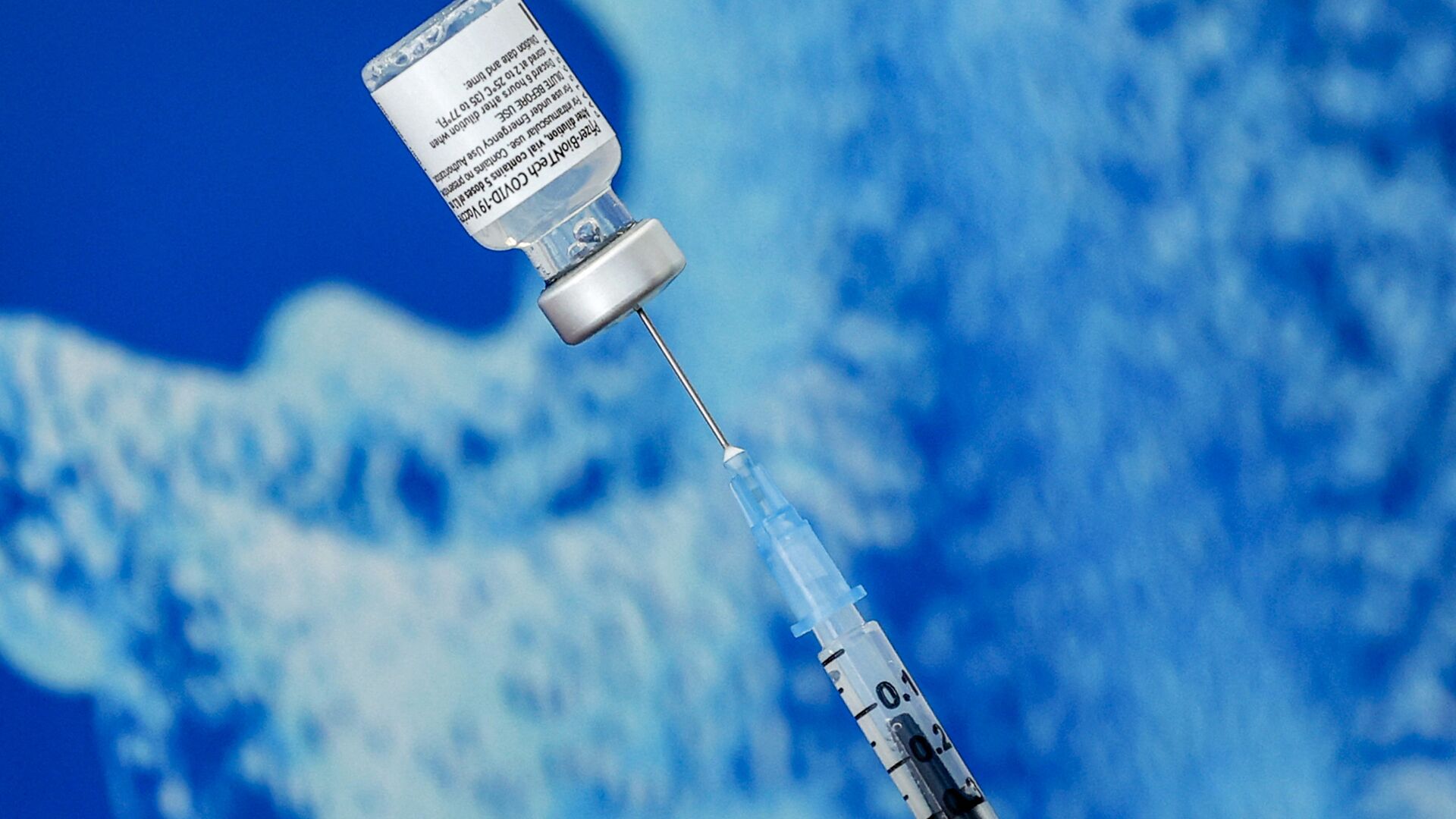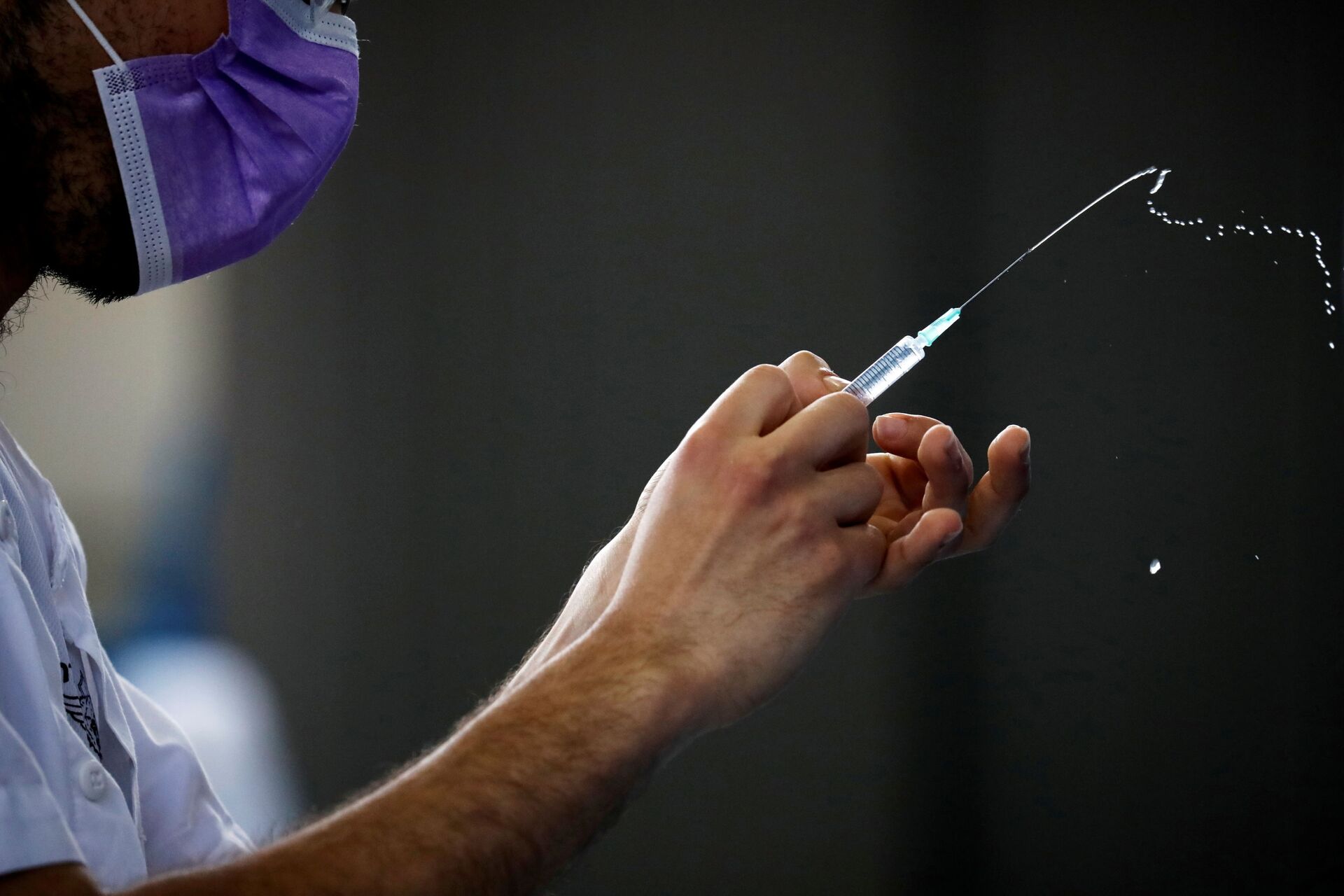https://sputnikglobe.com/20211025/covid-in-israel-may-be-under-wraps-now-but-a-fifth-wave-looms-large-experts-warn-1090184323.html
COVID in Israel May Be Under Wraps Now, But a Fifth Wave Looms Large, Experts Warn
COVID in Israel May Be Under Wraps Now, But a Fifth Wave Looms Large, Experts Warn
Sputnik International
To avoid another surge in coronavirus cases, an Israeli professor says the public should not be complacent. It needs to adhere to regulations set by the... 25.10.2021, Sputnik International
2021-10-25T07:36+0000
2021-10-25T07:36+0000
2021-10-25T07:36+0000
middle east
israel
vaccination
vaccine
coronavirus
covid-19
https://cdn1.img.sputnikglobe.com/img/07e5/04/0b/1082595268_0:160:3073:1888_1920x0_80_0_0_8e8cf37bea4882951aeff83fe57f2c71.jpg
Until very recently, many Israelis thought the country had eased its way out of the coronavirus pandemic, as nearly 6 of the nation's 9 million residents have already received two doses of the Pfizer vaccine. More than 3.9 million people have even received a third jab, with the number of daily cases continuing to decline. Sunday saw only 330 infections.But Israeli experts have already started sounding the alarm that a fifth wave of the pandemic is on its way and that it may hit the country as early as December.Understandable ConcernProfessor Cyrille Cohen, a member of the advisory committee for clinical trials of the coronavirus vaccine at the Israeli Ministry of Health, says the experts' concerns are understandable, especially as the pace of vaccinations has slowed down in the past couple of weeks.Yet, the slow pace of vaccinations can also be explained by yet another reason – the public's disbelief in the need for a third shot.Israel started offering a booster jab to the elderly in late July. Later on, the service was expanded and offered to everyone 12 years and older.The measure was met with ire and sparked demonstrations across the country, with the masses claiming that the need for a booster hadn't even been approved by the US Food and Drug Administration, and thus was potentially hazardous to the public.Complacency Comes With a PriceThat public reluctance might soon backfire. Last Tuesday, Israel registered its first case of a sub-variant of the Delta strain, and it is not totally clear whether it is more contagious or whether it is resilient to vaccines. And this is why, says Cohen, "the public should be humble and the scientists - cautious and take all the precautionary measures to avoid another wave. We need to be prepared".The Jewish state has already taken several steps in that direction. Public offices and businesses require visitors to show their green passes at the entrance. Face masks are still mandatory, mass gatherings are limited, while Ben Gurion International Airport, which will be opened to foreigners starting 1 November, will only admit vaccinated people. The latter will be permitted entry without the need to quarantine themselves.In the past, Israel wasn't that quick to respond. In July, when the number of daily infections started to go up, the international airport remained open and thousands of Israelis left the country to vacation abroad. Many came back with the virus, and the authorities were struggling to contain it from spreading.In addition, the third dose of the Pfizer vaccine was introduced late, whereas the green pass that limited gatherings was implemented only when the number of daily cases started to rise.Of primary concern is the younger population in Israel, specifically children ages 5 to 12. Even though research has shown that they are less prone to dying from the virus or developing severe symptoms, Israeli authorities are worried that them being unvaccinated will contribute to the spread of the disease, something that will distance the country from its goal of attaining herd immunity.The Health Ministry is now considering inoculating young people starting in December, but Cohen says more research is needed to determine whether such a move is actually required.And this is why, he suggests, that the Israeli public should not be complacent.
israel
Sputnik International
feedback@sputniknews.com
+74956456601
MIA „Rosiya Segodnya“
2021
News
en_EN
Sputnik International
feedback@sputniknews.com
+74956456601
MIA „Rosiya Segodnya“
Sputnik International
feedback@sputniknews.com
+74956456601
MIA „Rosiya Segodnya“
middle east, israel, vaccination, vaccine, coronavirus, covid-19
middle east, israel, vaccination, vaccine, coronavirus, covid-19
COVID in Israel May Be Under Wraps Now, But a Fifth Wave Looms Large, Experts Warn
To avoid another surge in coronavirus cases, an Israeli professor says the public should not be complacent. It needs to adhere to regulations set by the government. Local authorities, for their part, should be quick to respond to changing realities and adjust to the challenges posed by the pandemic.
Until very recently, many Israelis thought the country had eased its way out of the coronavirus pandemic, as nearly 6 of the nation's
9 million residents have already received two doses of the Pfizer vaccine. More than 3.9 million people have even received a third jab, with the number of daily cases continuing to decline. Sunday saw only 330 infections.
But Israeli experts have already started sounding the alarm that a fifth wave of the pandemic is on its way and that it may hit the country as early as December.
Professor Cyrille Cohen, a member of the advisory committee for clinical trials of the coronavirus vaccine at the Israeli Ministry of Health, says the experts' concerns are understandable, especially as the pace of vaccinations has slowed down in the past couple of weeks.
"A couple of weeks ago, people were in a rush to get a third jab, primarily because of the green pass [that granted access to public places only to those who had received a third shot - ed.]. Now, with it coming into effect, that urgency is gone".
Yet, the slow pace of vaccinations can also be explained by yet another reason – the public's disbelief in the need for a third shot.
Israel started
offering a booster jab to the elderly in late July. Later on, the service was expanded and offered to everyone 12 years and older.
The measure was met with ire and sparked demonstrations across the country, with the masses claiming that the need for a booster hadn't even been approved by the US Food and Drug Administration, and thus was potentially hazardous to the public.
Complacency Comes With a Price
That public reluctance might soon backfire. Last Tuesday, Israel registered its first case of a sub-variant of the Delta strain, and it is not totally clear whether it is more contagious or whether it is resilient to vaccines.
And this is why, says Cohen, "the public should be humble and the scientists - cautious and take all the precautionary measures to avoid another wave. We need to be prepared".
The Jewish state has already taken several steps in that direction. Public offices and businesses require visitors to show their green passes at the entrance. Face masks are still mandatory, mass gatherings are limited, while Ben Gurion International Airport, which will be opened to foreigners starting 1 November, will only admit vaccinated people. The latter will be permitted entry without the need to quarantine themselves.
"We work based on the assumption that the next variant, the so-called Omega, might be problematic. And if this is the case, we need to control our borders and be more stringent with testing those who arrive here. In general, we need to be faster in responding to the challenges posed by the virus".
In the past, Israel wasn't that quick to respond. In July, when the number of daily infections started to go up, the international airport remained open and
thousands of Israelis left the country to vacation abroad. Many came back with the virus, and the authorities were struggling to contain it from spreading.
In addition, the third dose of the
Pfizer vaccine was introduced late, whereas the green pass that limited gatherings was implemented only when the number of daily cases started to rise.
"I know that there is a sense that the pandemic is over but it is not. Although it doesn't look like a fifth wave is tangible right now, it is still a possibility", warned Cohen.
"The way to tackle it is to be quick in our response and adhere to the regulations [set by the government - ed.]. Yet, we also need to put maximum efforts into vaccinating those who haven't done so already and make sure that everyone in Israel gets the jab".
Of primary concern is the younger population in Israel, specifically children ages 5 to 12. Even though research has shown that they are less prone to dying from the virus or developing severe symptoms, Israeli authorities are worried that them being unvaccinated will contribute to the spread of the disease, something that will distance the country from its goal of attaining herd immunity.
The Health Ministry is now considering inoculating young people starting in December, but Cohen says more research is needed to determine whether such a move is actually required.
And this is why, he suggests, that the Israeli public should not be complacent.




